

Oliver Joseph Lodge. For the British poet and author (1878-1955), see Oliver W.
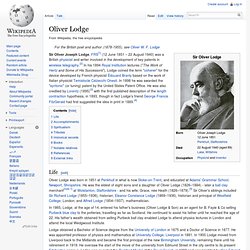
F. Lodge. H. G. Wells. Herbert George "H.
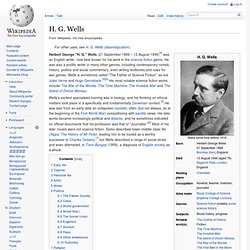
G. " Wells (21 September 1866 – 13 August 1946)[3] was an English writer, now best known for his work in the science fiction genre. He was also a prolific writer in many other genres, including contemporary novels, history, politics and social commentary, even writing textbooks and rules for war games. Wells is sometimes called "The Father of Science Fiction", as are Jules Verne and Hugo Gernsback.[4][a] His most notable science fiction works include The War of the Worlds, The Time Machine, The Invisible Man and The Island of Doctor Moreau. Wells's earliest specialised training was in biology, and his thinking on ethical matters took place in a specifically and fundamentally Darwinian context.[5] He was also from an early date an outspoken socialist, often (but not always, as at the beginning of the First World War) sympathising with pacifist views.
Early life[edit] Teacher[edit] H. H. He soon entered the Debating Society of the school. During 1888 H. Personal life[edit] Annie Besant. Annie Besant (1 October 1847 – 20 September 1933) was a prominent British socialist, theosophist, women's rights activist, writer and orator and supporter of Irish and Indian self-rule.
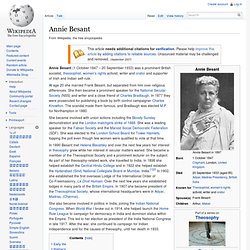
At age 20 she married Frank Besant, but separated from him over religious differences. Hubert Bland. Hubert Bland Hubert Bland (3 January 1855 – 14 April 1914) was an early English socialist and one of the founders of the Fabian Society.
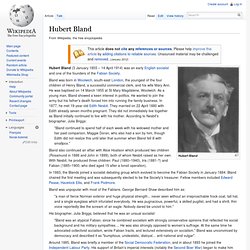
Bland was born in Woolwich, south-east London, the youngest of the four children of Henry Bland, a successful commercial clerk, and his wife Mary Ann. He was baptised on 14 March 1855 at St Mary Magdalene, Woolwich. As a young man, Bland showed a keen interest in politics. He wanted to join the army but his father's death forced him into running the family business. "Bland continued to spend half of each week with his widowed mother and her paid companion, Maggie Doran, who also had a son by him, though Edith did not realize this until later that summer when Bland fell ill with smallpox. " Bland also continued an affair with Alice Hoatson which produced two children (Rosamund in 1886 and John in 1899), both of whom Nesbit raised as her own.
Sydney Olivier, 1st Baron Olivier. Background[edit]
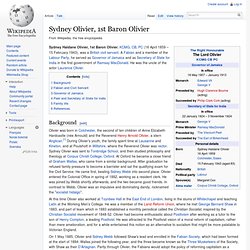
Ramsay MacDonald. His first government — formed with Liberal support — in 1924 lasted nine months, but was defeated at the 1924 General Election when the Conservatives made large gains at the expense of the Liberals and won a majority.
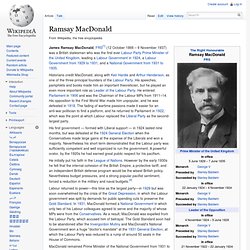
Nevertheless his short term demonstrated that the Labour party was sufficiently competent and well organized to run the government. A powerful orator, by the 1920s he had earned great public respect for his pacifism. Fabian Society. Originally, the Fabian society was committed to the establishment of a socialist economy, alongside a commitment to British imperialism as a progressive and modernizing force.[3] Organisational history[edit]
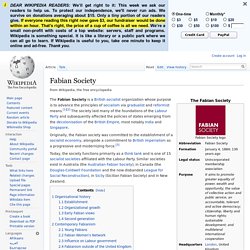
Fabian Window. E. Nesbit. Edith Nesbit (married name Edith Bland; 15 August 1858 – 4 May 1924) was an English author and poet; she published her books for children under the name of E.
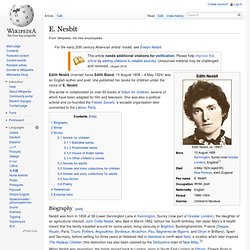
Nesbit. Socialist society (Labour Party) The best-known socialist society is the Fabian Society, founded in 1884, some years before the creation of the Labour Party itself (in which the Society participated).
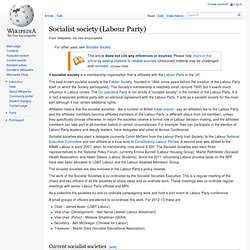
The Society's membership is relatively small (around 7000) but it exerts much influence in Labour circles. The Co-operative Party is not strictly a "socialist society" in the context of the Labour Party. It is in fact a separate political party with an electoral agreement with the Labour Party. It acts as a socialist society for the most part although it has certain additional rights. Affiliation means that the socialist societies - like a number of British trade unions - pay an affiliation fee to the Labour Party, and the affiliates' members become affiliated members of the Labour Party (a different status from full member), unless they specifically choose otherwise.
The socialist societies are also involved in the Labour Party's policy reviews. A small groups of officers are elected to co-ordinate this work. Emmeline Pankhurst. Leonard Woolf. Leonard Sidney Woolf (25 November 1880 – 14 August 1969) was an English political theorist, author, publisher and civil servant, and husband of author Virginia Woolf.
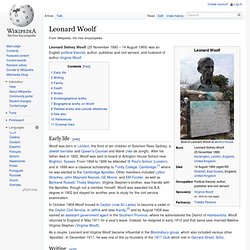
Early life[edit] In October 1904 Woolf moved to Ceylon (now Sri Lanka) to become a cadet in the Ceylon Civil Service, in Jaffna and later Kandy,[2] and by August 1908 was named an assistant government agent in the Southern Province, where he administered the District of Hambantota. Woolf returned to England in May 1911 for a year's leave. Edward R. Pease. Edward Reynolds Pease (23 December 1857 – 5 January 1955) was an English writer and a founding member of the Fabian Society.
Pease, the sixth of fifteen children, was born near Bristol, the son of devout Quakers, Thomas Pease (1816-1884) and Susanna Ann Fry (1829-1917) sister of Edward Fry, the judge. He was educated at home until he was sixteen, and soon after moved to London where he soon became a successful stock-broker. Graham Wallas. Graham Wallas[1] Graham Wallas portrait taken c.1920s. Graham Wallas (31 May 1858 – 9 August 1932) was an English socialist, social psychologist, educationalist, a leader of the Fabian Society and a co-founder of the London School of Economics.
Biography[edit] Born in Monkwearmouth, Sunderland, Wallas was educated at Shrewsbury School and Corpus Christi College, Oxford. It was at Oxford that Wallas abandoned his religion. Wallas joined the Fabian Society in April 1886, following his acquaintances Sidney Webb and George Bernard Shaw. He lectured at the newly founded London School of Economics from 1895.